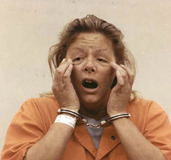Aileen: Life and Death of a Serial Killer (Nick
Broomfield & Joan Churchill, 2003)
 In Aileen: Life and
Death of a Serial Killer, Nick Broomfield’s follow-up to his 1992 feature Aileen
Wuornos: The Selling of a Serial Killer, the documentarian attempts to
provide some closure to the myriad unanswered questions that remained at the end
of his previous examination of the infamous female Floridian serial killer’s
treatment by the justice system. Instead he only proves that oftentimes the more
you look at an event, the less you ultimately know about it. As the film begins,
Broomfield is subpoenaed to testify in one of Wuornos’ appeals, in which the
competence of her original trial lawyer in being questioned. Essentially in the
hot seat because of his previous film’s questionable editing techniques,
Broomfield uses his reintroduction to his subject as an opportunity to make
another film about her. Though he begins to doubt the theories about her case
that he’d previously implied, the treatment immediately poses the question as
to whether or not he would have offered this apologia or second-guessed his wild
assertions from the first film if he never got called back to testify.
In Aileen: Life and
Death of a Serial Killer, Nick Broomfield’s follow-up to his 1992 feature Aileen
Wuornos: The Selling of a Serial Killer, the documentarian attempts to
provide some closure to the myriad unanswered questions that remained at the end
of his previous examination of the infamous female Floridian serial killer’s
treatment by the justice system. Instead he only proves that oftentimes the more
you look at an event, the less you ultimately know about it. As the film begins,
Broomfield is subpoenaed to testify in one of Wuornos’ appeals, in which the
competence of her original trial lawyer in being questioned. Essentially in the
hot seat because of his previous film’s questionable editing techniques,
Broomfield uses his reintroduction to his subject as an opportunity to make
another film about her. Though he begins to doubt the theories about her case
that he’d previously implied, the treatment immediately poses the question as
to whether or not he would have offered this apologia or second-guessed his wild
assertions from the first film if he never got called back to testify.
 Though Broomfield’s first film painted a picture of a
thoroughly corrupt society with Wuornos as a possible martyr of a deeply flawed
legal system, this time out the attitude is less ambivalent toward her.
Convicted of seven murders, this ex-prostitute faces multiple death sentences
and spends most of her time in interviews making wild claims about conspiracies
and contradicting what she’s previously said. When, in an apparent bout of
born-again religious fervor, she voices concern for the families of her victims
and confesses to the pre-meditation of each of the crimes that she committed.
Broomfield is thrown for a loop and forced to reexamine many of the allegations
he leveled in the first film. This new Aileen’s
function as a corrective for the harm Selling
might have caused provides many of its most insightful and seemingly honest
moments. There seems to be a genuine quest for truth in Broomfield after he has
his bubble burst, and his attitude toward Wuornos changes noticeably, even
though she later refuses to confess to premeditation again. Still, it’s tough
though to forget her chilling confession in which she admits to lying in an
attempt to beat the system or her desperate reasoning behind her own desire for
her execution in which she tells the filmmaker, “Nick, you have to kill Aileen
Wuornos because she will kill again.”
Though Broomfield’s first film painted a picture of a
thoroughly corrupt society with Wuornos as a possible martyr of a deeply flawed
legal system, this time out the attitude is less ambivalent toward her.
Convicted of seven murders, this ex-prostitute faces multiple death sentences
and spends most of her time in interviews making wild claims about conspiracies
and contradicting what she’s previously said. When, in an apparent bout of
born-again religious fervor, she voices concern for the families of her victims
and confesses to the pre-meditation of each of the crimes that she committed.
Broomfield is thrown for a loop and forced to reexamine many of the allegations
he leveled in the first film. This new Aileen’s
function as a corrective for the harm Selling
might have caused provides many of its most insightful and seemingly honest
moments. There seems to be a genuine quest for truth in Broomfield after he has
his bubble burst, and his attitude toward Wuornos changes noticeably, even
though she later refuses to confess to premeditation again. Still, it’s tough
though to forget her chilling confession in which she admits to lying in an
attempt to beat the system or her desperate reasoning behind her own desire for
her execution in which she tells the filmmaker, “Nick, you have to kill Aileen
Wuornos because she will kill again.”
 It’s his uncertainty about how to understand Wuornos that
seems to prompt Broomfield to look at her past. As he investigates a life filled
with homelessness, drug use, and prostitution, she becomes more sympathetic than
in any of her interviews. Before she herself seems to come to the conclusion
that she’s, at least on some levels, a victim of a society, Broomfield manages
to make a convincing argument to the same effect. This approach is fascinating,
but problems in it become apparent. The film presents an unabashedly biased
point of view, but never allows many of those who would disagree with what’s
being said a chance to speak. Worse still, Broomfield frequently seems as
willing as his subject to indulge in conspiracy theories and there often exists
the queasy hunch that his interest in her feeds her sickness. Though the
disturbing final interview in Aileen: Life and Death of a Serial Killer suggests a clear-cut case of madness in its subject, Broomfield’s
heavily slanted perspective makes even that gut feeling feels questionable.
It’s his uncertainty about how to understand Wuornos that
seems to prompt Broomfield to look at her past. As he investigates a life filled
with homelessness, drug use, and prostitution, she becomes more sympathetic than
in any of her interviews. Before she herself seems to come to the conclusion
that she’s, at least on some levels, a victim of a society, Broomfield manages
to make a convincing argument to the same effect. This approach is fascinating,
but problems in it become apparent. The film presents an unabashedly biased
point of view, but never allows many of those who would disagree with what’s
being said a chance to speak. Worse still, Broomfield frequently seems as
willing as his subject to indulge in conspiracy theories and there often exists
the queasy hunch that his interest in her feeds her sickness. Though the
disturbing final interview in Aileen: Life and Death of a Serial Killer suggests a clear-cut case of madness in its subject, Broomfield’s
heavily slanted perspective makes even that gut feeling feels questionable.
* * 1/2
05-02-03
Jeremy Heilman